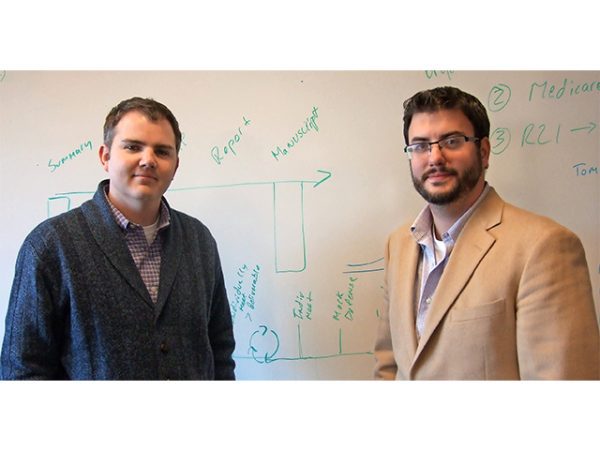Dr. Joshua Noone and Dr. Chris Blanchette Lauded For Presentation on Cachexia at ISPOR’s European Congress

At the 17th annual European Congress of the International Society for Pharmacoeconomics and Outcomes Research (ISPOR) Dr. Joshua Noone, Research Assistant Professor, and Dr. Chris Blanchette, Associate Dean of Research, presented a study on the national healthcare costs as they relate to Cachexia.
The conference, held in November in Amsterdam, brings together professionals from industry, education and government to discuss pharmaceuticals and their impact on the world. The five –day event featured over 2,000 presentations and 4,700 attendees. The poster presentation by Noone and Blanchette was named a finalist for first place.
This type of recognition at such a global event further spreads the word about the important work being done at UNCC. “At every conference UNCC becomes better known and better able to collaborate with industry partners,” says Noone.
While cachexia has mainly been studied as a contributing factor within a disease the significance of the study presented by Noone and Blanchette is that it is the first to feature cachexia as the primary subject of study across diseases. The hope is that with this initial study further research questions might be explored into the understudied area.
The group used a data set from the 2009 Nationwide Inpatient Sample to find an estimation of the United States prevalence of inpatient hospitalizations associated with cachexia, characterize the patient population in terms of demographic and clinical indications and estimate what factors impact the length of hospital stay in the cachexia population.
Interestingly, when comparing the total cachexia population to the non-cachexia population, a much higher percentage of the cachexic individuals were present in the more severe categories for loss of function. For example, 31.34% more of the cachexia patients were categorized as “major” loss of function than non-cachexic.
Also of importance was the discovery that those individuals at the highest loss of function during a hospital stay were 264% more likely to stay an extra day. And within a cachexia population, no individual disease, other than pneumonia, increases the odds of an extra hospital day.
According to Noone, the poster presentation helped attract the attention of a diverse group of interested people. “I had discussions about cachexia and our research with industry members from pharmaceutical companies and other ancillary health industry partners,” adds Noone.
Other CHHS employees who worked on the presentation include Susan Arthur, Debosree Roy and Bryce VanDoren.